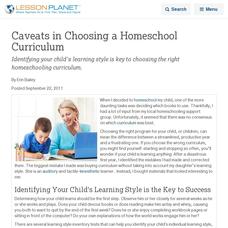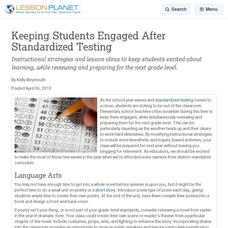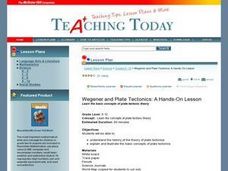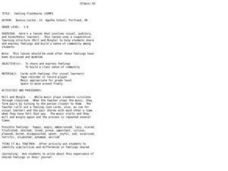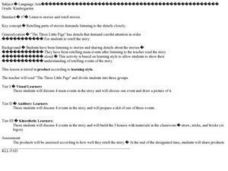Curated OER
Story Sequencing Lesson Plans That Promote Creativity
Explore new ways to enhance students' comprehension skills with creative story sequencing lesson plans.
Curated OER
Caveats in Choosing a Homeschool Curriculum
Identifying your child's learning style is key to choosing the right homeschooling curriculum.
Curated OER
Action!!!
Here is a good game to play with your charges. Pairs of pupils roll a die and choose the corresponding numbered card. They read the card and perform the action verb written there until the teacher calls out time.
Curated OER
Keeping students engaged after standardized testing
Instructional strategies and lesson ideas to keep students excited about learning, while reviewing and preparing for the next grade level.
Curated OER
Four Learning Styles
Students play a game where they insert the states of the United States onto a map, and discuss the four learning styles as they play. In this learning styles lesson plan, students discuss how each learning style would play and think...
Curated OER
Chemical and Physical Changes
Young scholars experiment, identify and apply the concepts of chemical and physical changes utilizing real-world examples. They discuss and model physical and chemical changes, answer guided questions and play a game that reinforces the...
Curated OER
Building Staircases: Understanding Slope
Students recognize the importance of slope. They use blocks to model the slope of a line and calculate the slope of a line on a coordinate grid. Afterward, they describe objects they encounter in their everyday lives that have slopes.
Curated OER
Building Fiction: Elements of a Short Story
Students define and interpret the elements found in a short story. Then they identify the elements of plot found in a short story. Students also apply knowledge of plot to an original work of fiction. Finally, they identify the...
Curated OER
Dear Abby: A Direct and Indirect Characterization Lesson Plan
Students practice identifying and creating examples of characterization based on comprehension. They assess direct and indirect characterization and use conflict in a plot to generate a piece of writing. Each student selects accurate...
Curated OER
Inference Lesson Plan
Students practice assessing graphics to infer and identify an author's implicit and explicit meaning in a piece of text. They evaluate the effectiveness of information found in maps, charts, tables, graphs, diagrams, cutaways and through...
Curated OER
Investing in Early America Game: Early Industrial, Transportation, and Communications Revolution
Students review pages in the text to find out what was happening in each of the areas. They use the "Investment Opportunities Game Sheet" to record their investments, assume an investor identity, which influence how they choose to invest...
Curated OER
Reading the Periodic Table
Students explore the structure and function of the periodic table of elements. Though memorization drills and games, students working in pairs, identify the elements of the periodic table, their grouping, their properties and their...
Curated OER
Wegener and Plate Tectonics: A Hands-On Lesson
Students are introduced to and experiment with the basic concepts of plate tectonic theory as well as assess the history of the theory of plate tectonics. They explain and illustrate the basic concepts through diagrams and models of...
Curated OER
Animal Alphabet Book
Students identify each letter of the alphabet. They listen as the teacher reads an animal alphabet picture book. Students listen to the alphabet song. They create their own movements for the alphabet song. Students are asked to name...
Curated OER
Money
Students study the value of the penny, nickel, dime, quarter and dollar. They demonstrate how different coin combinations equal the same amounts of money and write money amounts using the decimal point and dollar sign. They try to...
Curated OER
Organizational Patterns: Comparison and Contrast Writing
Middle schoolers write an essay comparing and contrasting their school experiences. Through guided practice, they create an outline of their elementary school experience and middle school experience. Using their outlines, students...
Curated OER
The Constitution
Young scholars identify, discuss and analyze the principles of the Constitution of the Unites States of America. They identify the four main principles of the Constitution and explain in detail the meaning and purpose of each of the four...
Curated OER
Handwriting: Group Upper and Lower Case Letters
Students recognize and practice characteristics of upper and lower case letters. They assess how to write letters in a straight line, a slanted line and in a curve and then write the letters covered on their individual dry erase board or...
Curated OER
Movement and Music: An Introduction to Slavery
Students create a slavery timeline. They identify key leaders in the anti-slavery movement. Students are asked what they can recall about slavery. They review the following vocabulary words slavery, spirituals, abolitionists, and...
Curated OER
Feeling Flashbacks
Students share and express feelings in order to build a sense of class community. They participate in an activity entitled Mill and Mingle.
Curated OER
Feeling Flashbacks
Students investigate feelings with their class. In this feelings lesson, students mingle with their class and share a specific personal feeling with a random student. Students record their experience in their journal.
Curated OER
Things That Make Sound
Students investigate sound. In this physics instructional activity, students listen to a variety of sounds on a tape recorder and use picture cards to hold up the picture card for each sound used.
Curated OER
Retelling The Three Little Pigs
Students retell the story The Three Little Pigs. In this reading comprehension instructional activity, students listen to the story of The Three Little Pigs and discuss the main events of the story. Students prepare a skit of one of the...
Curated OER
Mathematics: Technology and Connections
Sixth graders interpret and replicate patterns. In this patterns lesson, 6th graders are given an item with a definite pattern which they must replicate using a calculator or computer and then justify how they relate. Students listen to...



